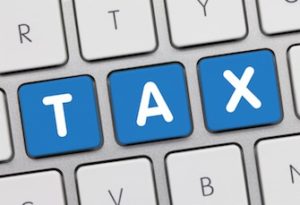
The issue of states collecting sales tax from internet sellers is in the news again. This time “nexus tax” debate has gone all the way to the supreme court.
The case, which the court will decide by June, is South Dakota v. Wayfair, 17-494. It has the state of South Dakota suing Wayfair, Overstock.com and Newegg, which don’t collect taxes in South Dakota. The case challenges the current rule that remote sellers are only required to collect sales tax if they have a physical presence (nexus) in the state where the goods are sold.
The Supreme Court first tackled the topic of out-of-state sales in a 1967 case involving catalog company Quill (Quill vs. North Dakota). It was revisited in 1992. Since then Congress has introduced about half-a-dozen different legislative proposals that would require internet retailers to collect sales tax on out-of-state transactions. Thus far, none of them have stuck.
The Basics
The crux of the issue is that state lawmakers believe that online retailers are cheating them out of billions in sales tax revenue that would go to the states. Small local businesses claim they can’t fairly compete with online retailers who don’t charge sales tax.
For their part, many online retailers claim that the burden of collecting sales tax would devastate their business.That because they would need to purchase expensive software to deal with the more than 10,000 US tax jurisdictions – all with varying rates and rules. Online sellers also say that new sales tax laws would run directly counter to the Commerce Clause of the U.S. Constitution, which prohibits states from discriminating against interstate commerce.
However, it’s important to note that in many states, even if a consumer doesn’t pay sale tax on an item they purchase online, they are obligated to calculate the sales tax amount (it’s called a Use Tax) and remit that as part of their annual state taxes. Most people are unaware of those laws or simply ignore them. The National Conference of State Legislatures says that consumers dodged $17.2 billion in local sales taxes on goods sold over the internet in 2016. And most states have no way of overseeing or enforcing such existing sales tax laws.
So, instead, state lawmakers and regulators are attempting to go after retailers to collect the sales taxes from consumers at the time of purchase.
Big Implications
The most recent high court fight centers on a South Dakota law enacted in 2016 with the explicit aim of overturning Quill. South Dakota is urging the court to ditch the “physical presence” rule and let sales taxes be imposed on any company with an “economic presence” in a state.
South Dakota’s law would require retailers with more than $100,000 in annual sales (or more than 200 seperate transactions with state residents) in the state to pay a 4.5 percent tax on purchases.
Other states have also tried creative approaches to get around nexus laws. Massachusetts and Ohio count the internet cookies retailers place on customers’ computers as a physical presence in the state. Basically, by claiming the lines of code that live on the customer’s computer as a tiny piece of local real estate, these states have asserted a collection obligation, regardless of where the retailer is physically based.
The Impact on Affiliates
This case and other attempts to impose internet tax laws have big implications for the online space. It’s especially complicated for online marketers and retailers.That’s because the cost of determining and collecting taxes in those states is often overwhelming for the retailers.This is not the case for online retailers with lots of financial resources (such as Amazon), but rather for smaller companies that do business online.
That means these smaller retailers often choose to cut ties with affiliate marketers located in those states. The reason – many laws claim affiliates represent a physical presence or economic presence in the state for the retailer. This is a miscategorization. Affiliates are their own independent businesses and not employees of the retailer. Affiliate marketers simply promote and advertise products to their own audience for retailer – much like an online billboard.
However, some online retailers would rather lose the revenue generated by affiliates in those states imposes sales tax collection laws.. They feel it’s less costly than the hefty sum of money necessary to implement systems to collect the taxes.
A devastating ripple effect then takes place. Those affiliates lose income from online retailers that stop doing business with them.That means their income is depleted. In turn, they are paying less in business taxes and income tax to the state that imposed the taxes. In some cases, affiliates have moved to another state without such internet tax laws in order to save their livelihood.
But affiliates and online marketers aren’t opposed to an internet tax. Many advocate for a national internet sale tax that will level the playing field across all states.
The Outcome
U.S. Supreme Court justices signaled they are divided in the South Dakota case. Three justices (Anthony Kennedy, Neil Gorsuch and Clarence Thomas) have already indicated they would overturn the 1992 ruling (Quill v. North Dakota). In the April hour-long argument, Justice Ruth Bader Ginsburg suggested she would join them. She twice referring to the Quill precedent as “obsolete.” She said letting states tax internet sales would mean “equalizing sellers.”
The question is whether that group can win over a fifth vote. Justice Sonia Sotomayor indicated she would rather leave it to Congress to overturn the Quill ruling. Sotomayor said the real problem for states was not Quill but the absence of a mechanism for collecting the taxes directly from consumers.
Online retailers and marketers will need to keep a close eye on this case. Regardless of the outcome, internet retailers are going to have to deal with this issue. States will continue to seek creative ways to update laws to increase their revenue and keep pace with the new technological era.